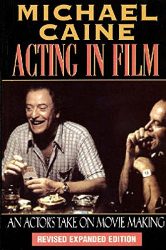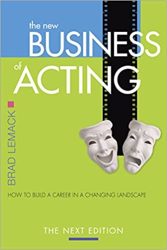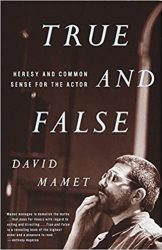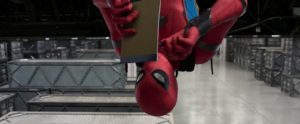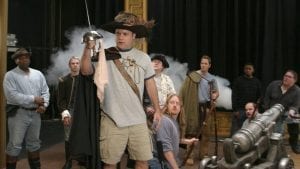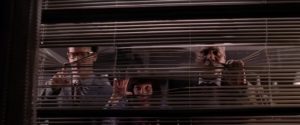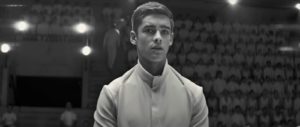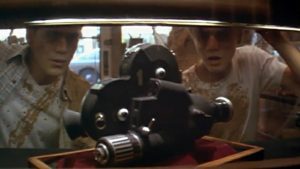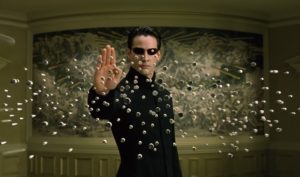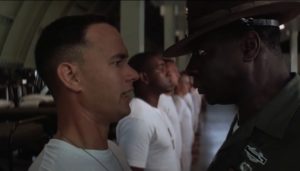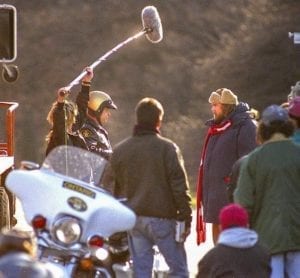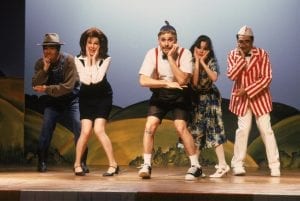
A character’s body language and movements can be affected not just by their emotions but also by their habits. This article gives examples of how the repetitive tasks people do as part of their jobs can affect their behaviour.
As a result of their jobs, people can reach for things they’re used to (e.g., access cards), stare at things related to their job (e.g., veins), and adopt work-related habits in other ways, such as by constantly knocking on doors, having a particular stance, or organizing things in stores for free.
This article gives specific examples of such occupation-related habits (based on information from places like this Reddit post) and has them categorized in a way to help you discover more habits/movements beyond this article.
1. Instinctively reaching for objects you’re used to having with you.
People who work in buildings where they need to swipe an access card at every door or in the elevator sometimes find themselves searching for their access card even when they’re elsewhere. This access card might typically be in a certain pocket, on a lanyard, or at the hip, as shown in the video below about the scientific researcher:
A mechanic who typically carries a useful rag in the back pocket at work might reach for their empty back pocket even at home when they want to wipe their hands. A similar habit has been reported by someone who constantly uses a box cutter at work and normally carries that box cutter in their back pocket. People who use walkie talkies for work sometimes get too accustomed to being able to talk with anyone they want with their walkie talkie so, when they’re off work and see someone a bit far off who they want to say something to, they sometimes find themselves reaching for the place where they normally have their walkie talkie. Similarly, a person who works at a drive-thru restaurant and has to wear a headset for work can sometimes bring that habit home, reaching up for their invisible headset when trying to say something to someone in another room.
2. Looking at and paying attention to things like you do at your job.
Nurses and doctors often look at the veins on people’s arms to see how easy it would be to get an IV in there. They sometimes stare at people’s veins, and even compliment people on having nice veins, when they’re off work. There are actually a lot of memes about it (you can see some with a Google search here). Similarly, welders can often look at the quality of the welds they see in everyday life, such as on gym equipment. In addition to plain attention, some professionals judge others based on those things they pay attention to. For example, Uber drivers and mailmen may look with disapproval at house numbers that are difficult to see.
People can pay an especially great amount of attention towards things that are associated with safety in their line of work. For example, teachers, especially kindergarten teachers, have a habit of periodically doing a head count to make sure that they don’t lose anyone, such as on a field trip. Many of them keep automatically doing head counts even when they’re among adults, outside of work. As shown in the video below, preschool teachers feel responsible for children even if they are just random children on a playground:
Firefighters, whenever they walk into a building, tend to pay attention to where the possible emergency exits are, and lifeguards often notice when children are running where they’re not supposed to, even if it’s in a store rather than a pool. You might hear them occasionally yell, “Walk!”
3. Having the urge to say things the way they’re said in the job.
Receptionists and other people who pick up phones on behalf of companies often have the urge to respond to even personal phone calls with their standard company phrase, which might be something like, “Thank you for calling [company name], this is [name], how can I help you?”
People who work as waiters in restaurants often have a number of words they’re used to calling out to prevent collisions with others. For example, they often say, “Behind!” when they’re walking behind someone, or “Corner!” when they’re at a blind corner, as shown in the video below.
Sometimes these people incorporate these words into their life outside of work; for example, when grocery shopping, some have the urge to yell “Corner!” when turning a corner in/out of an aisle. Other words they’re used to calling out are for safety, such as “Hot!” or “Sharp!” when they’re carrying something hot or sharp, respectively; some incorporate these words at home as well. When certain ways of speaking at work feel convenient, people may choose to incorporate them into their life consciously, such as when those working in the military use the phonetic alphabet (A = Alfa, B = Bravo, C = Charlie, etc.) when spelling things out to people over the phone.
4. Doing things the way they’re done in a job.
Teachers often eat quickly during lunchtime because they constantly have a lot of lesson preparation and marking to do. Some teachers find themselves continuing to eat quickly even at home. Similarly, those who work in kitchens and are used to eating while standing up at work sometimes also eat while standing up at home. Police officers and those who work with potentially aggressive patients in psych wards can be seen talking to people while having their body angled/bladed in an “interview stance”, with one leg slightly back to help prevent kicks to the groin (and, if applicable, to help keep the gun farther out of reach of the person being talked to) and blading their body slightly diagonally. This stance is described in the video below:
Also, when deciding where to stand or sit, for safety reasons some professionals choose to stand or sit with their back to the wall (thus avoiding attacks from behind).
Sometimes at a job you can also learn a more efficient way of doing things, and you can use that skill in your everyday life. I can tell you that, after working as a waiter for many years, no matter what the situation (even if I’m just helping a friend with dinner), I’m always taking plates the way I learned in the restaurant. You can see that technique taught in the video below.
Note: fine dining serving habits are different from serving habits from casual restaurants. The technique shown above tends to be fine in more casual restaurants full of 10-20 person parties. For fine dining situations, you don’t carry more than one plate per hand.
5. Reacting to things as in the job.
When an emergency response professional, like a firefighter or ambulance driver, hears an alarm, that means they need to hurry somewhere and may face a life-or-death situation. It can be difficult for such professionals to leave this habit at work and, consequently, if they’re sleeping and hear some kind of alarm, even if it’s just a morning alarm, they can wake up wide-eyed, possibly with a big inhale, and ready to snap into action, even though such a response might be frightening to loved ones. Another habit of some first responders, such as police officers, is to unbuckle their seatbelt a bit in advance when they see that they’re approaching the destination they’re driving towards (to be able to jump out of the vehicle quickly if needed). Thus, even in everyday life, when they’re driving and they see that they’re almost there, some of them undo their seatbelt while rolling up to the house.
Job-related reactions can make their way into everyday life even when they’re not related to emergencies. For example, there are many jobs that involve constantly knocking on doors before entering them. Custodians need to knock on doors while saying, “Custodian!” and, for many medical professionals, it’s common courtesy to knock on patients’ doors before entering. As a result, some of these professionals find that they have a tendency to knock on any door they go through, even accidentally knocking on the door of their bathroom stall as they exit. You can see an example of the type of knocking that medical professionals do in the video below:
Another type of non-emergency job-related reaction is from those who work in retail; some of them develop the reaction of packing down any empty cardboard box they see. Those in medicine often use hand sanitizer and, as a result, some of them are unable to walk by hand sanitizer dispensers without the urge to use the hand sanitizer. Teachers are other professionals who also find themselves often using hand sanitizer, even from before the pandemic, as shown in the video below.
Other job-related reactions can be not to objects but to actions, such as leaning. People who wear a tie or lanyard for work sometimes have a habit of holding their tie/lanyard to their chest when leaning forward (to prevent the tie/lanyard from hanging forward). As a result, such people sometimes put their hand to their chest when they lean forward even if they’re not wearing the tie or lanyard. Those who work in lab coats and are used to having things in the breast pocket of their lab coat sometimes have a similar tendency to use their hand to stop things falling out of that pocket when leaning forward, and they sometimes put their hand there even if they don’t have a pocket there.
Another action towards which people can have job-related reactions is the action of standing up. Many people who work with sensitive data on computers in big offices have the reaction of locking their computer (pressing Windows key + L on their keyboard) whenever they stand up, such as to go to the washroom. These people sometimes find themselves automatically locking their computer when they stand up even if they were just casually using the computer at home.
6. Basically, doing the job for free.
Those who work in grocery stores are so used to organizing products properly, making sure that they are perfectly aligned and facing forward, that they find the urge to correct the position of products even when they’re just shopping in stores where they don’t work. These actions are called “fronting” and “facing,” and you can see what they look like in the video below:
Similar tendencies have been found among those who have worked in clothing stores (they tend to fold messy clothes they see in stores) and bookstores (they have an urge to straighten books and put them in perfect order). For similar reasons, other professionals, such as groundskeepers, have a tendency to pick up litter. Those who worked in a restaurant sometimes have a tendency to stack their plates after they are done eating. Vet technicians can find that, even when they meet any random dog, such as their friend’s dog, they automatically check the dog’s ears, teeth, skin, etc. instead of just patting them.
7. Not doing certain things as a result of the job.
Some scuba divers find they don’t use the thumbs up hand sign to mean “all good” (instead they use the “ok” hand sign) because, as shown in the video below, in scuba diving, doing the thumbs up is a specific signal that means you need to go up to the surface and end the dive for whatever reason.
Having a certain job can also make people more aware of how their actions can make someone’s job easier or harder, so some professionals take some extra steps or avoid doing certain things to make others’ jobs easier, not because of just habit but also because they want to be nice. For example, some people never touch the glass part of a door because they know that it’s someone’s job to clean off the handprints off that part of the door.
Reflection
What’s something you repeatedly do at work? Do you do those things when you’re off work as well? You can also observe people whose professions you know and see if they do certain things differently from you and consider why those differences could be. Is there something they do that you don’t? Or something that you do that they don’t? How many of the things that you previously assumed were differences due to personality can also be explained by differences in occupation? When you see a difference, you can also ask to see why that difference exists. Maybe they’re doing something in order to be nice to someone in a way you hadn’t even thought about.
For more information related to body language, check out the article about Acting Hand Gestures. You can also scroll down to see other articles you might like.


